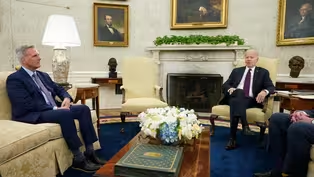
New guidelines recommend mammograms start at 40
Clip: 5/9/2023 | 5m 50sVideo has Closed Captions
New guidelines recommend earlier mammograms amid rise in breast cancer among younger women
New guidelines say women should begin getting regular mammograms every two years starting at age 40 if they are at average risk of breast cancer. That’s a significant change from previous guidance by the U.S. Preventive Services Task Force that said women could start routine mammograms at 50. Stephanie Sy reports.
Problems playing video? | Closed Captioning Feedback
Problems playing video? | Closed Captioning Feedback
Major corporate funding for the PBS News Hour is provided by BDO, BNSF, Consumer Cellular, American Cruise Lines, and Raymond James. Funding for the PBS NewsHour Weekend is provided by...

New guidelines recommend mammograms start at 40
Clip: 5/9/2023 | 5m 50sVideo has Closed Captions
New guidelines say women should begin getting regular mammograms every two years starting at age 40 if they are at average risk of breast cancer. That’s a significant change from previous guidance by the U.S. Preventive Services Task Force that said women could start routine mammograms at 50. Stephanie Sy reports.
Problems playing video? | Closed Captioning Feedback
How to Watch PBS News Hour
PBS News Hour is available to stream on pbs.org and the free PBS App, available on iPhone, Apple TV, Android TV, Android smartphones, Amazon Fire TV, Amazon Fire Tablet, Roku, Samsung Smart TV, and Vizio.
Providing Support for PBS.org
Learn Moreabout PBS online sponsorshipAMNA NAWAZ: New guidelines out today say women should begin getting regular mammograms every two years starting at the age of 40 if they're at average risk of breast cancer.
That is a significant change from previous guidance by the U.S. Preventive Services Task Force that said women could start routine mammograms at the age of 50.
Stephanie Sy focuses on what you need to know.
STEPHANIE SY: This change comes after an increase in diagnoses of breast cancer among younger patients, and an alarming number of deaths among Black women, who are already 40 percent more likely to die of breast cancer.
More than 43,000 women die of breast cancer in the U.S. each year.
The new guidelines would cover more than 20 million women between 40 and 49 years old who might be at risk, but women with a family history of genetic risk of breast cancer are advised to get screened earlier.
To help spell out the details of this guidance.
I'm joined by Dr. Carol Mangione, immediate past chair of the United States Preventive Services task force and professor of medicine and public health at UCLA.
Dr. Mangione, thanks so much for joining the "NewsHour."
Among the reactions I'm hearing to your task force's new guidelines are: Finally.
Other groups, including the American Cancer Society, have been recommending mammograms for women in their 40s for years.
But since 2009, your task force has said women with average risk should wait until 50 for the screening.
So what drove this reversal?
DR. CAROL MANGIONE, Professor of Public Health, UCLA: Well, actually, our task force has said that we should use mammography selectively in women at the age of 40, after a discussion with their doctor going over the -- their own personal preferences and risk profile.
But now, with new and inclusive science, we're able to extend that recommendation to all women 40 and over to get a mammogram every other year.
And if women are able to do this, it will cause a reduction in death from breast cancer about 20 percent.
Importantly, you mentioned that Black women have a 40 percent higher chance of dying from breast cancer.
And so this recommendation is very important for them.
They actually will have the most benefit from starting screening at 40 and using screening every other year.
Now, this isn't going to totally take care of that terrible inequality, because, when you think about breast cancer care, it starts a screening, diagnosis, access to state-of-the-art treatments.
And there are detriments in health equity along that whole pathway.
And so we're going to have to improve all of that before we really see a similar mortality for Black women as what white women have.
STEPHANIE SY: Is there new evidence that shows why women in their 40s, in particular, are seeing higher rates of breast cancer?
DR. CAROL MANGIONE: There really isn't.
And we have an extremely urgent call for research in our recommendation to better understand what's driving this change.
STEPHANIE SY: Should women still be concerned about the consequences of overscreening?
Experts were saying not so long ago that overscreening was leading to unnecessary treatment, even harmful treatment.
Are you saying now that the benefits outweigh those risks?
I mean, just help clear that -- clear that up for us.
DR. CAROL MANGIONE: Right.
So, the test first always balances the benefits and the risks, as we see it in the medical evidence.
And using our modeling results and the clinical trial results, we're certain that the benefits far outweigh the risks if you use mammography every other year.
Now, if you decide to have annual testing and you're at average risk, what that means is, you're going to have twice as many false positives.
And some of those false positives, a small amount, could end up in a situation where a woman is diagnosed with breast cancer, but she doesn't actually have it.
And so these are the harms that need to be balanced against finding more and earlier breast cancer that might help with surviving and being healthy longer.
STEPHANIE SY: There still seem to be a lot of unanswered questions, Doctor.
Women over 74, for example, they don't know if they should keep doing mammograms.
Women like me with dense breast tissue -- that's about 40 percent of women -- they don't know if a mammogram is enough to detect cancer.
Should we know more about breast cancer, a disease that affects, I believe, one in eight women, than we know right now?
DR. CAROL MANGIONE: We absolutely should.
And your first point, women over the age of 74 have been excluded from the clinical trials on breast cancer screening.
And we definitely need more research in that group to know if stopping at 74 is really the right number.
And for women with dense breasts, which happens to be about half the women in the United States, we also have an urgent call for more research on what is the best supplemental test to get, when to start getting that test, and how often to get it.
And whether you're talking about ultrasound or MRI, those questions are really unanswered at this point.
STEPHANIE SY: We all know someone touched by breast cancer.
I know I, for one, made my appointment for my mammogram today.
Dr. Carol Mangione, thank you.
DR. CAROL MANGIONE: You're welcome.
Biden meets with Republicans ahead of debt ceiling deadline
Video has Closed Captions
Clip: 5/9/2023 | 8m 10s | Biden meets with Republicans as U.S. runs up against debt ceiling deadline (8m 10s)
Community colleges pay expenses hoping to boost graduation
Video has Closed Captions
Clip: 5/9/2023 | 8m 28s | Community colleges pay student expenses beyond tuition hoping to boost graduation rates (8m 28s)
Investigators reveal Texas gunman's extremist views
Video has Closed Captions
Clip: 5/9/2023 | 5m 39s | Investigators reveal details about Texas outlet mall gunman's extremist views (5m 39s)
Jury finds Trump liable for sexual assault and defamation
Video has Closed Captions
Clip: 5/9/2023 | 8m 15s | Breaking down the verdict as jury finds Trump liable for sexual assault and defamation (8m 15s)
Remembering the 8 people killed in the Texas mall attack
Video has Closed Captions
Clip: 5/9/2023 | 2m 5s | Remembering the 8 people killed in the Texas mall attack (2m 5s)
Rep. Vicente Gonzalez discusses pressure on border towns
Video has Closed Captions
Clip: 5/9/2023 | 6m 10s | Texas Congressman Vicente Gonzalez discusses pressure on border towns as Title 42 ends (6m 10s)
Providing Support for PBS.org
Learn Moreabout PBS online sponsorship
- News and Public Affairs

FRONTLINE is investigative journalism that questions, explains and changes our world.

- News and Public Affairs

Amanpour and Company features conversations with leaders and decision makers.












Support for PBS provided by:
Major corporate funding for the PBS News Hour is provided by BDO, BNSF, Consumer Cellular, American Cruise Lines, and Raymond James. Funding for the PBS NewsHour Weekend is provided by...





